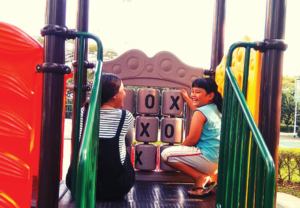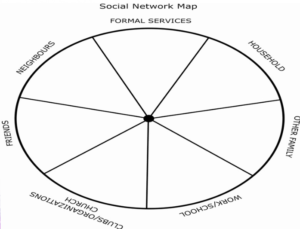How Can We Manage Anger Success-fully?
How Can We Manage Anger Success-fully?

Sometimes in our journey as a mentor, we might experience a few anger episodes from our young mentee. What do you do when that happens?
Today, we will share some tips we’ve picked up along the years that we have found useful in helping our mentees manage their emotions in the long run.
What triggers anger?
Anger doesn’t just happen. It usually arises from an event, series of events, or unmatched expectations of self and/or others, which can result in feeling frustrated, fearful, resentful, stressed, and/or disappointed.
When unresolved, this becomes unhealthy.
What can help?
1. Build Rapport
This is an important step. When trust is established, your mentee will feel safe and open up, helping them process their emotions and allowing you to understand the situation better.
2. Explain how anger comes about
Explaining and breaking down the process (Event – Emotions – Anger) can help your mentee share and understand more about the situation at each stage. Together, you can discuss any issues or solutions after, and even help them reframe their thought process.
3. Identify and articulate any emotions they are experiencing
Using a Feelings-Vocabulary Chart can help your mentee articulate their feelings and identify their emotions. By doing so, both you and your mentee can make sense of and address any other underlying emotions which led to anger.
4. Use empowering words and reframe the situation
4.1 Refrain from “must” or “should” and discuss any unrealistic expectations
Anger often arise from unmet expectations. Hence, it is good to remind your mentee to refrain from using words that lead to expectations.
For example, instead of “My best friend should know whatever I am thinking without me having to tell her”, we can change it to “I can communicate how I feel so my best friend understands what I am feeling and thinking”.
4.2 Reframe the situation
Replace a bad thought with a good one.
For example, your mentee is feeling anxious because her best friend has not replied to her text messages. You also know that your mentee’s friend is caught up in school or home front.
Instead of “My best friend is ignoring me. She doesn’t like me anymore”, you can help your mentee reframe it to “My best friend is currently occupied with some challenges in her life so she might not be able to reply me immediately. In the meantime, I can focus on my schoolwork, other activities, reach out to other friends and when my best friend is ready, we will reconnect again”.
4.3 Use “I” statements
Helping your mentee take responsibility for the emotions they are experiencing will help them feel less powerless and more in control.
For example, instead of “He made me angry when he pushed me”, we can change it to “ I feel angry because he pushed me”.
5. Listen and use open-ended questions as prompters
You may not have the solution for every problem but listening often times can be more than enough. Using open-ended questions such as “Tell me more” or “How did you feel” will help them process the situation and their emotions more.
6. Empowering activities over anger
6.1 The ball-up fist
This is a great experiential analogy that might help your mentee understand anger more. The script is as below, which can be modified to suit your mentee accordingly.
“Clench your fist and let go whenever you want you.
What do you see on your palm? (Nail marks.)
Anger is like a balled-up fist. The person who is angry also hurts himself during the process.
The longer the person holds onto anger, the longer and deeper he will feel the hurt too.
The choice is up to the person, he can let go at any time.”
6.2 Self-esteem name acronym
Have fun with this activity by coming up with empowering acronyms for your child’s name. This will help remove any negative subconscious self-beliefs they have about themselves.
For example, Sam can be Strong, Articulate, Magnetic.
6.3 Master or slave?
This is a great way of explaining to a child if they understand mandarin. In mandarin, the word anger is 怒, which can be broken into 奴(slave) and 心(heart).
By breaking 怒 into 奴 and 心, you can ask your mentee if they would like to be a slave to their heart or a master over their heart?
If their response is master, you know they are open to changing the way they view anger. If their response is slave, give them more time to process and re-evaluate their feelings.
Final thoughts
We hope this has helped you understand how anger comes about and also steps you can take with your mentee to manage this emotion better.
Anger often has a negative connotation, but the truth is, anger is an emotion, just like happiness, sadness, and fear. When managed healthily, it can even spur one on further.
Remember to celebrate any small progress you see in your mentee along the way! The more we focus on the positives, the more we will see authentic, lasting, and impactful changes.
_____
If you like to be a mentor, drop us a message here!
Also, if you wish to give and help us run our programmes, please click here. A little goes a long way as we invest in creating stronger tomorrows.
_____
Alternative “Feelings-Vocabulary” charts :
1. Words to describe emotions
2. Mood Chart
References :
1. Adapted from Life Community’s Workshop – Anger is not a bad word
2. Picture Credit Freepix
Five Domains of Mentoring
Blog
Five Domains of Mentoring
Our Thoughts

There may be a common stereotype that there is little hope for children from vulnerable backgrounds to break out of their existing cycles, but in truth, they can have real advantages compared to their peers.
The fact that they have to put in more effort and work harder to succeed contributes to valuable intrinsic advantages that they will carry through life.
When they are given the right support early on and enter into adulthood, they not only would have academic knowledge gained (like their peers would have), but also inner strength, grit, and knowledge that they gained from the mountains they had to climb growing up (something their peers may lack at the same point in time).
Mentoring is one way to support building these foundations, and it can be a vague concept for many.
We have broken it down into five focus areas below which you can discuss and guide your mentee through. We hope this provides structure as you prepare your mentoring sessions or start on your mentoring journey. 😊
1. Education
Although education is not the end-all-and-be-all, it does open doors and increase opportunities in their futures. Encouraging your mentee to attend school regularly, be engaged during lessons, set goals with them, and motivate them to achieve their goals are great ways to guide them in this area.
Take time to listen if they share any challenges faced and also guide them on navigating these challenges based on your own experiences.
If you have concerns or need further support, remember you can always reach out to one of the staff or your mentor support group. We are here for you!
2. Financial Literacy and Values
This is an area a lot of us might have wished was taught in school!
Helping your mentee develop the right mindset, habits, and knowledge from a young age go a long way in setting good foundations in the long run, such as being financially independent and/or debt-free in adulthood.
Below are some topics you could discuss with your mentee to help them understand finance and have a better grasp of it.
- How is money earned
- Budgeting
- Being responsible and managing their pocket money
- Difference between their needs and wants
- Importance of saving
- Importance of spending wisely
- Interest rates, inflation and investment options (Usually more suited for older mentees)
3. Healthy Coping Outlets
It is especially helpful to discuss and identify people your mentee trust and can turn to, activities to do, and/or actions to take, during challenging times.
This prepares them in advance so they know who to confide in or what they can do when they are overwhelmed, instead of turning to unhealthy coping alternatives.
Below is a simple chart that can help kick start this discussion.
Reference material : A social network map can help identify trusted key figures for your mentee (Tracy & Whittaker, 1990)

4. Vision and Purpose
Most children and youths grow up having aspirations largely based on the people they know, such as their parents or peers. Some children may not have the privilege of having consistent or healthy adult figures in their lives, which may then narrow down what they know.
By exposing your mentee to different education and career options, and even your past experiences, this expands their horizon on what is available and the different paths they could choose.
Remember to also discuss ways and action plans to get to their vision and goals. The more options they are aware of early on, the better decisions they can make.
5. Intrinsic Skills (Character Traits and Social Skills)
Having good character traits, such as resilience, grit, self-motivation, conscientiousness, are crucial in achieving success later in life.
Working through problems and issues with your mentee patiently, encouraging and challenging them to pick themselves up when they fall and persist on, and even doing activities together such as sports, will help them develop these traits.
Winning is great and knowing how to fail well is perhaps even more important for one to progress strongly in life.
Besides character traits, children and youths with good social skills have often been linked to job success, independence, and emotional well-being in their adulthood. You can help your mentee develop skills in the areas below:
- Survival skills: Learning to listen, follow directions, ignore distractions, use nice or brave talk, reward oneself
- Interpersonal skills: Learning to share, ask for permission, join an activity, wait for their turn
- Problem-solving skills: Learning to ask for help, apologize, accept consequences, decide what to do
- Conflict resolution skills: Learning to deal and manage teasing, losing, accusations, being left out, peer pressure
Remember to focus on the desired behaviours and outcomes!
___
The five domains listed above are, and not limited to, some areas to guide your mentee through and help them become more well-rounded.
As we have mentioned, you may not see changes right away, but over time, you will see your mentee approach tasks and situations more confidently and with better attitudes.
Not only that, when they see themselves succeed and progress, they will carry this motivation through each stage of their lives!
___
If you like to join us in this movement to help our young ones be stronger, drop us a message here!
Also, if you wish to give and help us run our programmes, please click here. A little goes a long way as we invest in creating stronger tomorrows.
___
References:
- EduGrow for Brighter Tomorrows
- Paul Tough, Helping Children Succeed, 2016
- NASP centre, https://www.naspcenter.org/factsheets/socialskills_fs.html
Growing Stronger Together
STORIES
Growing Stronger Together
FOCY
CASEWORKER
“Jane joined us when she was six years old in July 2015. She is 11 years old this year. Her family lives in a two-room flat. Her father is incarcerated, and her mother is the main caregiver to Jane and her brother (13 years old).
Jane and her older brother often get into physical fights. Sometimes, I would see scars and bruises from their fights.
Because of this, she lived at Ahuva Good Shepherd Home for a period of time on weekdays as her mother works long hours during the day at a food store and is unable to look after her and prevent the physical fights when she is not around.
Her brother is also in our programme and his caseworker (also from Life Community) is working with him on this issue. After a period of intervention, mentoring, and counselling, her brother has stopped all form of physical violence towards her. They are working on managing his emotions and also healing deeper emotional wounds. He has shown much improvement as well which we are very encouraged to see.
Jane has also since moved back to live with her family, both weekdays and weekends.
Their mother’s working hours became shorter during the circuit breaker period and needed more assistance for essential items. To help them out financially and physically, we increased the quantity of our monthly food rations during these few months.
I am visiting Jane more often to ensure she is doing well. I am also looking into financial assistance applications for her. Jane has a full future ahead of her and we will do all we can, such as providing a stable consistent adult figure in her life for care and guidance, ensuring her physical safety, building her character and life skills through workshops and activities, all to ensure she grows holistically.”
-Jane’s caseworker, FOCY Programme
___
Would you like to empower our young clients to be stronger? Click here to find out how you can support the work we do.
Follow us on facebook, instagram, and/or linkedin for weekly updates on how your support has made a difference in our young clients’ lives 🙂
Making Friends
Testimonial
Making Friends
TEACHER
“Laura is one of my students in the Primary Three class. We noticed she did not have many friends in class and came to understand that she had a few past unresolved misunderstandings and arguments which did not make her too popular with her peers. This affected her, especially during the first three months of 2019.
I decided to spend more quality time with her to understand. It was a process and after two months, we had slowly developed a bond. She started to share why she had acted the way she did and as she shared, we discussed how and why her actions could hurt another person, better ways to make friends and be understood by her peers, such as sharing her thoughts and feelings calmly, learning that sharing is important and so is waiting for her turn.
As I shared, I could see that she was listening to what I was saying and over the weeks and months, I saw small improvements in her behaviour. She did not have any ill intention – she just did not know to explain herself in a manner that was appropriate and acted out in frustration when things did not go her way.
At the same time, I wanted Laura to know that she is accepted and cared for as she is, and I did it through words and actions to affirm, advise, and encourage. We also spent time together on her schoolwork and spelling tests, which improved gradually much to her delight.
By the end of 2019, I noticed that she was interacting much better with her classmates. They chatted and played together happily.
More importantly, I am glad that Laura is much happier, smiles more, and is managing her emotions much better than before. Her self-esteem and confidence have improved. My hope is that she will remember that she has overcome these challenges, know that she is able should another challenge arise and carry these values through her life.”
-Laura’s Teacher, Life Student Care
Recent Comments